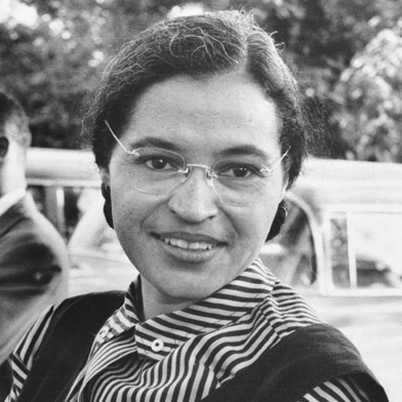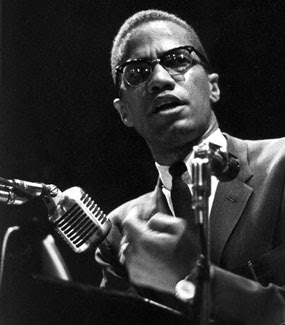CIVIL RIGHTS LEADERS OF THE 60'S

Rosa Parks
Civil Rights Figure
Born: 4 February 1913
Died: 24 October 2005
Birthplace: Tuskegee, Alabama
Best known as: The civil rights icon who wouldn't
give up her bus seat
Name at birth: Rosa Louise McCauley
In 1955, Rosa Parks was an African American living in Montgomery, Alabama -- a city with laws that strictly segregated blacks and whites. On 1 December 1955, after her day of work as a seamstress at a local department store, Rosa Parks boarded a city bus. When she refused to give up her seat to a white man, the bus driver called police, and Rosa Parks was arrested and fined. The resulting bus boycott by African-Americans, led by Reverend Martin Luther King, Jr., caused a national sensation. The boycott was a success and led to desegregation in Montgomery and elsewhere in the United States. Over time, Rosa Parks became a national icon of civil rights and African-American pride. Parks worked as an assistant to Michigan Congressman John Conyers, Jr. from 1966 until her retirement in 1988, and she founded the Rosa and Raymond Parks Institute for Self Development in 1987. She was awarded the Presidential Medal of Freedom by Bill Clinton in 1996. Parks resided in Detroit until she died of natural causes at the age of 92 on October 24, 2005, in her apartment on the east side of the city. She and her husband never had children.

Martin Luther King, Jr.
Clergyman / Activist / Civil Rights Figure
Born: 15 January 1929
Died: 4 April 1968 (assassination)
Birthplace: Atlanta, Georgia
Best known as:
The civil rights hero who said "I have a dream"
Martin Luther King, Jr. was an African-American clergyman who advocated social change through non-violent means. A powerful speaker and a man of great spiritual strength, he shaped the American civil rights movement of the 1950s and 1960s. King was pastor of the Dexter Avenue Baptist Church in Montgomery, Alabama from 1954-59. There he led blacks in the Montgomery bus boycott of 1955-56, an action inspired by the arrest of Rosa Parks when she refused to give up her seat on a public bus. Racial segregation on city buses was ruled unconstitutional in 1956; the boycott ended in success, and King had become a national figure. King returned to his home town of Atlanta in 1959 and became co-pastor with his father of the Ebenezer Baptist Church, a position he held until his death. On the 100th anniversary of Abraham Lincoln's Emancipation Proclamation in 1963, King organized a march on Washington, D.C. that drew 200,000 people demanding equal rights for minorities. It was in this march that he delivered his most famous speech “I have a dream”. King won the 1964 Nobel Peace Prize, becoming at the time the youngest recipient ever. His writings included Stride Toward Freedom (1958, a history of the Montgomery bus boycott), Why We Can't Wait (1963) and Where Do We Go From Here? Chaos or Community (1967). King was shot to death by James Earl Ray in 1968 while visiting Memphis, Tennessee.

Malcolm X
Religious Figure / Civil Rights Figure
Born: 19 May 1925
Died: 21 February 1965 (assassination)
Birthplace: Omaha, Nebraska
Best known as: Assassinated leader of the 1960s
black power movement
Name at birth: Malcolm Little
While in prison for burglary, Malcolm Little adopted the Black Muslim faith and became a minister of the Nation of Islam upon his release in 1952. As Malcolm X, he was a charismatic advocate of black separatism who rejected Martin Luther King, Jr.'s policies of non-violence. At first a follower of Elijah Muhammad, Malcolm X broke with the Nation of Islam in 1964. That same year he made a pilgrimage to Mecca and shortly afterwards he embraced orthodox Islam and took the name El-Hajj Malik El-Shabazz. He recanted some of his earlier more strident viewpoints on race, though he remained a staunch advocate of "black power." He was shot to death by a group of men while giving a speech in New York City in 1965; some of the men had connections to the Nation of Islam, though a formal tie between that group and the assassination was never proven.